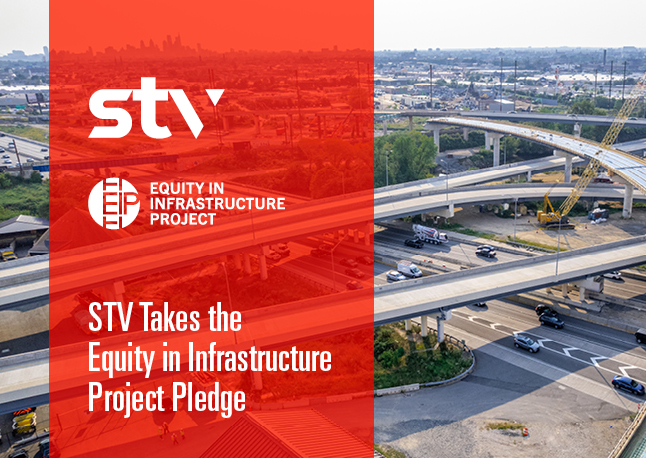Since 1932, the U.S. Conference of Mayors has brought together mayors and municipal leaders representing cities with populations of 30,000 of more to engage directly with the President and Congress on the most pressing issues they face in their communities. Held January 17-19 in Washington, D.C., STV’s team, including CEO Greg Kelly, PE, and Board Member Lynda Tran, is excited to attend the event and continue our dialogue with local leaders about how we can partner to make communities better.
Keith Benjamin, STV vice president and head of the organization’s Cities Initiative, will be a key part of STV’s delegation at the event. A former associate administrator for highway policy and external affairs for the Federal Highway Administration (FHWA) at the U.S. Department of Transportation (USDOT), as well as the former director of department of traffic and transportation for the City of Charleston in South Carolina, Benjamin has demonstrated long-standing talent and passion for empowering individuals and organizations. Here, he discusses the intrinsic value of the U.S. Conference of Mayors and how STV can work as a trusted advisor to the event’s attendees.
1. What makes the U.S. Conference of Mayors such a unique gathering for our industry? What do you anticipate will be some of the themes for this year’s gathering?
The U.S. Conference of Mayors is a signature event for the communities we serve across the country, bringing together more than 250 bipartisan mayors from throughout the United States. Some of the issues we anticipate will be central to the conversation this year include the key transportation priorities, building more resilient communities, public-private partnerships and the affordable housing crisis. It’s a unique gathering because it provides the opportunity for intimate one on one interactions with mayors who are experiencing a broad spectrum of challenges. Having this audience allows our team to listen and better understand the vision of decision makers so we can better weave it into the work we are charged to do. With that, we are able to establish ourselves as a trusted advisor to mayors as they look to move their individual visions forward.
2. Prior to coming to STV, you demonstrated a far-reaching commitment to public service through your roles at the U.S. Department of Transportation and the City of Charleston. What makes you so passionate about this work? How is your current role at STV further fulfilling that mission?
Going back to when I was first introduced to the world of transportation it was always through the lens of the “who” not just the “what.” I.e., who built the infrastructure, who operated the bus, who has the dignity of safe accessibility, who is included at the decision-making table and who ultimately benefits. Keeping the who at the forefront has maintained a place of empathetic accountability in the work.
As a former city transportation director, you realize that transportation decision-making is personal. You understand the sacrifices of a signals team working to repair intersections after a natural disaster; you feel a deep call to action for families at funerals for those loved ones lost due to unsafe roadway conditions; you get excited about innovative mobility projects that will provide equitable access to underinvested neighborhoods; and you see how a community can rally around a major cause that will change lives for generations.
As 2025 begins, we are in a major moment of transition, with a new federal administration, the start of terms for municipal elected officials and the appointment of key agency leadership at the state and local levels. There is a key opportunity for STV to lock arms with decision-makers and work in partnership to take their thoughts, concepts and priorities and make them real for the constituents they serve. At STV, having hyperfocus on our local presence and relationships with key partners is more important than ever. To influence and support local project decisions we must leverage all of the resources and expertise STV has at its disposal. Elected and agency leadership all over the country are navigating a myriad of challenges and are looking for consistent, intentional and trustworthy allyship. Driving a local mindset will ultimately enhance how we deliver for clients, stakeholders and decision-makers not just through our technical expertise but in our active engagement of the community.
As a former city transportation director, you realize that transportation decision-making is personal.
3. As one of STV’s leaders within its Cities Initiative, how are you working to promote growth in infrastructure, transportation and organizational resilience across the United States?
STV’s team cultivates innovative and effective solutions by leveraging our organization’s multidisciplinary capabilities to support cities, counties and metropolitan planning organizations (MPOs). In doing these, we’re building long-term relationships that solidify trust to deliver the vision of any community.
We do that by having a handle on the geopolitical landscape – our team of thought leaders and national experts can assess factors that either benefit or inhibit projects, initiatives and partnerships with local municipalities. We aspire to advise decision makers on community focus areas to manage expected outcomes on projects and initiatives. We also look to identify program management and advisory needs with cities, counties, and MPOs
4. Looking forward, what are some of the universal challenges our city and municipal clients face as it relates to public development? How can partners like STV help our clients overcomes these challenges?
Following the passage of the Bipartisan Infrastructure Law and Inflation Reduction Act, middle-market localities have received billions of dollars for over 66,000 projects and plans in safety, resiliency, active transportation, bridges, transit, rail and air/aviation. Though this level of funding is unprecedented, so is the increase in need for technical assistance, advisory support, staff capacity, and program management. Many cities, counties and MPOs lack the in-house expertise needed to deliver on their efforts and demand nimble and knowledgeable professional services to not just to execute tasks but be a thought leader. STV’s team features a mix of national experts who understand the broader landscape, and local support and resources with an intimate knowledge of each municipality’s unique challenges. It’s that mix of skills and resources that allows us to lift up cities, municipalities and MPOs and help them overcome these challenges.








